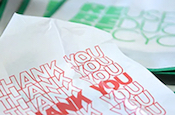On March 1, New York’s statewide ban on single-use plastic bags went into effect. The law, passed by the state legislature in an effort to reduce the usage of plastic bags—which often ends up in landfills or waterways—prohibits retailers such as grocery stores from providing customers with plastic carry-out bags.
New Yorkers are encouraged to instead bring their own reusable bags, or they can purchase paper alternatives for a mandatory five-cent fee, three cents of which will go to the State Environmental Protection Fund, with the remaining two cents going to the county or city government (fees would be waived for shoppers receiving SNAP or WIC benefits). Businesses can also opt to sell their own multiple-use tote-style bags.
Exceptions apply, such as single-use plastic bags used for produce, or bags covering raw meats or made-to-order foods. Dry cleaners and laundry services would be allowed to continue using bags, as would pharmacists handing out prescription drugs. Trash bags and food storage bags would also remain for sale. And carryout bags provided by restaurants won’t be covered under the law either.
The law isn’t without its problems. The state’s Plastic Bag Task Force found that paper bags actually have a larger carbon footprint than their plastic alternatives, as they require a significant quantity of water to produce as well as increased energy for production and transportation. This means increased costs for New York-area retailers, who also have to contend with future bag shortages, as paper bag manufacturers in 2020 are harder to come by than plastic.
Then there’s the little-known loophole that thicker plastic bags—over 10 mils thick—fall under the state’s current rubric of “reusable,” meaning that retailers could, hypothetically, bypass the law by handing out free, thicker versions of the flimsier alternatives normally found at grocery check-out lines.
New York’s bag ban is only the latest episode in an era where issues of sustainability and environmental consciousness have emerged as overarching themes in the headlines. California voters approved a statewide ban of plastic bags in 2016, and similar plastic bag bans have since been enacted in Connecticut, Delaware, Oregon and Vermont. Last year, Maine became the first state to ban the selling or distribution of disposable food containers made of polystyrene, otherwise known as Styrofoam. San Francisco International Airport followed suit by banning the sale of plastic water bottles at its restaurants, convenience stores and vending machines.
Since then, Americas’ focus on sustainability has only increased. The latest Food News Study commissioned by Hunter Public Relations, which surveys Americans on the most memorable food-related news items of the year, discovered that sustainability ranked as the most prevalent issue for the first time in 2019, taking three of the top ten food stories of the year.
Opposition among consumers and businesses to the plastic straw bans that popped up across the country, recent laws to end the sale of plastic water bottles and Styrofoam food container bans were the fifth, eighth and ninth most popular food stories in Hunter’s latest annual study, now in its 17th year.
 |
“In 2019, we saw three stories related to sustainability in the top ten,” Hunter CEO Grace Leong told O’Dwyer’s. “That’s a remarkable rise in a relatively short time and reflects the fact that Millennials and Gen-Z in particular are becoming more sustainably-minded.”
Study after study shows that today’s consumers—particularly young consumers—are more likely to trust and do businesses with companies that support environmental and socially-responsible causes.
Research published by NYU Stern’s Center for Sustainable Business last year found that 50 percent of growth among all Consumer Packaged Goods between 2013-2018 came from sustainability-marketed products, even though those products represent only 16.6 percent of the total CPG category.
A similar Nielsen report discovered that products featuring sustainability claims outperformed competing products in sales by more than three percent in 2018.
Finally, a Jan. study by the National Retail Federation discovered that 70 percent of North American shoppers think it’s important for brands to be eco-friendly, with more than two-thirds (69 percent) willing to pay a premium for recycled products.
Because sustainability issues have surged in the national conversation, it’s no surprise that companies in the food and beverage sector have continued leveraging those messages into branding opportunities in an effort to differentiate themselves from the competition.
If the headlines are any indication, we might expect sustainability practices to increase in the coming years, both in response to consumer trends and because they recognize it’s the right thing to do.


 What the biggest meal of the day can teach us about serving up effective nutrition communications campaigns.
What the biggest meal of the day can teach us about serving up effective nutrition communications campaigns. Tips to refine and amplify your CPG brand strategy to win in 2024 and beyond.
Tips to refine and amplify your CPG brand strategy to win in 2024 and beyond. Strategic communications strategies for success in the growing “food is medicine” movement.
Strategic communications strategies for success in the growing “food is medicine” movement. How brands can authentically communicate sustainability issues and create a brand experience that’s compatible with consumers’ values.
How brands can authentically communicate sustainability issues and create a brand experience that’s compatible with consumers’ values. Communicating the effects that climate change and a growing world population have on our food system—and why change is needed.
Communicating the effects that climate change and a growing world population have on our food system—and why change is needed.


 Have a comment? Send it to
Have a comment? Send it to 
No comments have been submitted for this story yet.